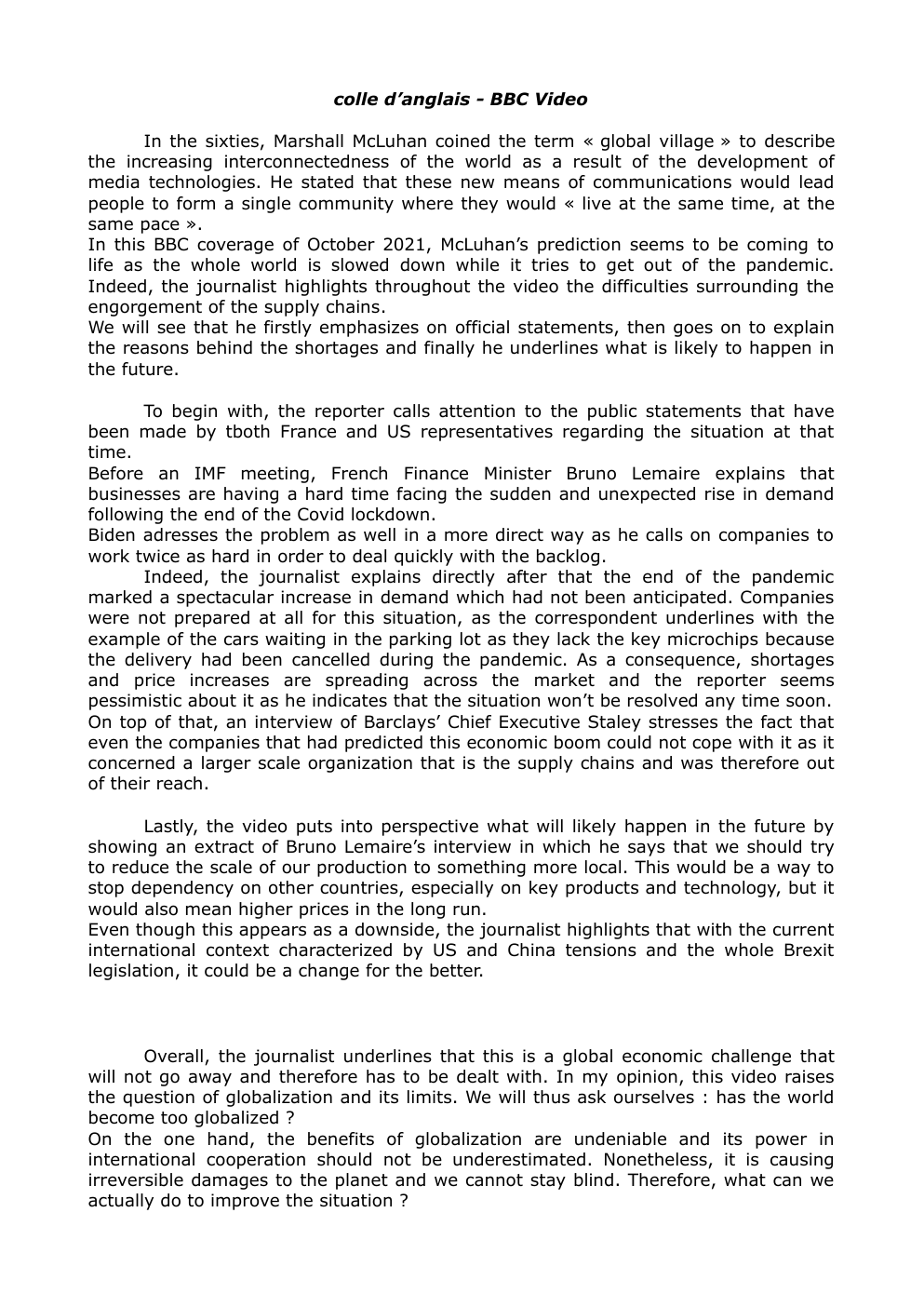the problem of supply chains
Publié le 27/05/2023
Extrait du document
«
colle d’anglais - BBC Video
In the sixties, Marshall McLuhan coined the term « global village » to describe
the increasing interconnectedness of the world as a result of the development of
media technologies.
He stated that these new means of communications would lead
people to form a single community where they would « live at the same time, at the
same pace ».
In this BBC coverage of October 2021, McLuhan’s prediction seems to be coming to
life as the whole world is slowed down while it tries to get out of the pandemic.
Indeed, the journalist highlights throughout the video the difficulties surrounding the
engorgement of the supply chains.
We will see that he firstly emphasizes on official statements, then goes on to explain
the reasons behind the shortages and finally he underlines what is likely to happen in
the future.
To begin with, the reporter calls attention to the public statements that have
been made by tboth France and US representatives regarding the situation at that
time.
Before an IMF meeting, French Finance Minister Bruno Lemaire explains that
businesses are having a hard time facing the sudden and unexpected rise in demand
following the end of the Covid lockdown.
Biden adresses the problem as well in a more direct way as he calls on companies to
work twice as hard in order to deal quickly with the backlog.
Indeed, the journalist explains directly after that the end of the pandemic
marked a spectacular increase in demand which had not been anticipated.
Companies
were not prepared at all for this situation, as the correspondent underlines with the
example of the cars waiting in the parking lot as they lack the key microchips because
the delivery had been cancelled during the pandemic.
As a consequence, shortages
and price increases are spreading across the market and the reporter seems
pessimistic about it as he indicates that the situation won’t be resolved any time soon.
On top of that, an interview of Barclays’ Chief Executive Staley stresses the fact that
even the companies that had predicted this economic boom could not cope with it as it
concerned a larger scale organization that is the supply chains and was therefore out
of their reach.
Lastly, the video puts into perspective what will likely happen in the future by
showing an extract of Bruno Lemaire’s interview in which he says that we should try
to reduce the scale of our production to something more local.
This would be a way to
stop dependency on other countries, especially on key products and technology, but it
would also mean higher prices in the long run.
Even though this appears as a downside, the journalist highlights that with the current
international context characterized by US and China tensions and the whole Brexit
legislation, it could be a change for the better.
Overall, the journalist underlines that this is a global economic challenge that
will not go away and therefore has to be dealt with.
In my opinion, this video raises
the question of globalization and its limits.
We will thus ask ourselves : has the world
become too globalized ?
On the one hand, the benefits of globalization are undeniable and its power in
international cooperation should not be underestimated.
Nonetheless, it is causing
irreversible damages to the planet and we cannot stay blind.
Therefore, what can we
actually do to improve the situation ?
First and foremost, in today’s international context a strong argument regarding
globalization....
»
↓↓↓ APERÇU DU DOCUMENT ↓↓↓
Liens utiles
- HDA : the problem we all live with
- The problem we all lives with
- Church's theorem and the decision problem
- A SIMPLE SOLUTION TO AN IMPOSSIBLE PROBLEM The day after the renter and I dug up Dad's grave, I went to Mr.
- « The problem we all live with »

































